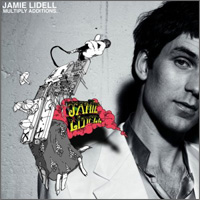
(07.04.06) Jamie Lidell has been making waves in the alternative music scene since his
first releases on the label that started it all, Warp Records. Muddlin
Gear, released in 2000, gained Lidell worldwide renown. His second
installment, Multiply moved Lidell closer to the Swing sound. Journalists,
reviewers and fans have made many attempts to pigeonhole Lidell’s style, to
categorize his music into one of the numerous genres that float around on
the Warp imprint. Some have compared Lidell to Otis Reading, Stevie Wonder
and even Prince. Lidell’s blend of soul, jazz and electronic makes for an
interesting musical medley to say the least. Yet the latest outing by the
British singer/producer only features one piece by Lidell himself, Multiply
Additions is basically a remix album but features some masters of the IDM
scene to add their slant to Lidell’s music.
A former Warp artist, and veteran of the Skam label, Simon Pyke (a.k.a. Freefrom) serves up a twisted funk version of “When I Come Back Around.” The
track is heavily dancefloor influenced, with some bleep techno echo’s and a
warped synth solo. The raw lyrics secreted together with some slippery
sample mixing makes for a track which bleeds funk with a big beat
undercurrent. Served up next on Multiply Additions are Four Tet, offering
up their computerisation of “The City.” As with Freeform’s remix, the soul
element of Lidell’s original remains an elemental component of Four Tet’s
version; but now digital glitch and clipped up beeps are laminated over to a 30th century version of Lidell’s original score. Techno giant and godfather Luke
Vibert offers up a slicked out synth driven mix of “A Little Bit More.” A
track with a very pop feel, when it comes to vocal tone, layered over with a
primitive electro chord line dissected by the bassy chorus to create a
rendition with an addictive personality. Yet, the remix seems to smack of a
lack of effort. Vibert’s version, although having solid elements, lacks a
substance that becomes more and more noticeable as the track develops
leaving the listener disappointed on the merit and quality of the artist’s
past expeditions. Mocky gives a remix that is pretty much uninspired, a
track that appears frightened to stray from Lidell’s original leaving a
timid and uninteresting result.
The album picks up again as Matthew Herbert steps into the fray to give the
listener two bonus track remixes. Firstly Herbert turns his hand to
“Multiply” with Herbert’s “Hoedown Bump Instrumental,” a quirky shuffling
track with an unmistakable clever playfulness reminiscent of the Doctor
Rockitt days. Next the old guard experimenter puts his own spin on “A Little
Bit More.” Once more Herbert teases the original, slowly building up his
boyish melodies and plinks. Yet, Herbert’s second remix effort pales in
comparison to his first. His take on “A Little Bit More,” quickly erodes any
listener’s interest as the track develops but fails to advance.
The album’s final track, the Mara Carlyle Ukulady Mix of “Game for Fools”
sums up the LP. All the mixes are interesting, but in many respects they
stuck too rigidly to Lidell’s soul style. Whether or not this is a bad thing
is fully open to debate, but in this reviewers opinion the remixers seemed
to be hampered when it came to turning their electronic stylings to Lidell’s
music. This is not to say that the remixes on Multiply Additions are not
of worth, although the Mocky take on “What’s The Use” is a let down. But,
there is a feeling that if the artists had let their own style become more
dominant a much more interesting album would be the result. Further listens
to the LP do not open up new doorways; they in fact take away from many of
the tracks, such as Vibert’s remix which on first hearing seems like a good
spin on the Lidell’s original but sadly becomes dull on further spins.
Quite simply, this album is not especially good. It is by no means an awful
release, but it has nothing outstanding as one may have hoped. The premise
of the album is a tried and tested formula, artists trying their hand at a
different genre, but it is poorly executed on this release. Few of the mixes
ring true, others falter after a couple of hearings, others are just plain
bad. This album is one to scratch off from the Summer CD spending lists.
Multiply Additions is out now on Warp. Buy it at Amazon.com.



















